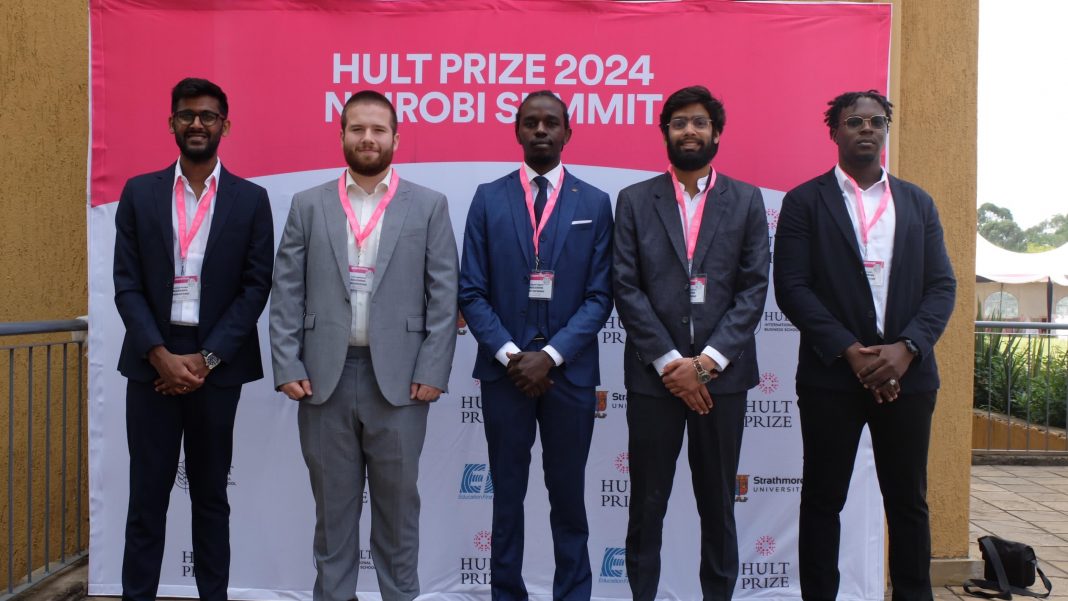Students from Nottingham Business School have pitched their idea to tackle the growing issue of electronic waste through recycling and recovering precious metals at a prestigious international entrepreneurship competition.
Five MSc Innovation Management & Entrepreneurship students – Luke Hailstone, Devansh Poddar, Eugene Oigara, Pierre Louis, and Ajinkya Khairnar – visited Nairobi, Kenya, to take part in The Hult Prize, which challenges young people to solve the world’s most pressing issues through social entrepreneurship.
Rapid technological advancements coupled with short lifespans of products has led to a growing problem of electronic waste.
According to the World Health Organisation, e-waste is the fastest growing solid waste stream in the world. In 2019, an estimated 53.6 million tonnes of e-waste were produced worldwide, but only 17.4% was recycled. With the remainder of waste sent to landfill or burned, e-waste can release lead into the environment and have an adverse impact on human health.
The NBS team, who hail from Kenya, India, France, and the UK, presented their Imagination Engineering business concept which uses ‘urban mining’ to address the issue.
The innovative method uses naturally occurring microorganisms to break down e-waste and recover precious metals like gold, silver, and copper, providing a sustainable and environmentally friendly alternative to traditional recycling methods.
Their pitch included the creation of a state-of-the-art bioleaching facility, equipped with advanced equipment, and managed by a team of experienced microbiologists and waste management experts. The facility is designed to offer comprehensive e-waste recycling services to businesses, governments, and individuals looking to dispose of their electronic devices responsibly.
To create a prototype, the group conducted research with e-waste recyclers and other stakeholders in the e-waste recycling industry to understand any challenges and receive feedback on usability, efficiency, and effectiveness in recovering valuable materials from e-waste. Their business plan, which also had to consider financial sustainability and potential barriers to taking the product to market, was improved and refined throughout the process.
The Hult Prize receives thousands of entries each year and only a selection are chosen to go through to summit events across the world, where ideas are pitched to a panel of esteemed judges, global business leaders, and thought leaders. While the Imagination Engineering team didn’t progress to the final, the group valued the experience and the opportunity to share their business plan.
Devansh Poddar, age 23, from Mumbai, said: “One of the biggest challenges we faced was aligning our scientific research with market needs and ensuring our solution was both technically feasible and commercially viable.
“I learned a great deal about project management and the importance of aligning technical solutions with market demands. This will be beneficial as we move forward with our careers and future projects.
“A standout moment for me was pitching to the judges and receiving recognition for our idea. It was a validation of our hard work and creativity, and it gave us the confidence to continue pursuing our vision.”
Luke Hailstone, 23, from London, added: “One of the most memorable moments for me was networking with other teams and learning about their innovative solutions. The exchange of ideas and the supportive community at the summit were truly inspiring.
“A significant challenge we faced was refining our pitch under time pressure and ensuring that our complex scientific concept was communicated clearly and effectively to a non-technical audience.
“This experience taught me the importance of adaptability and clear communication, which I believe will be invaluable in my future endeavours.”
Paul Wreaves, course leader for MSc Innovation Management and Entrepreneurship at NBS, said: “To reach the summit stages of The Hult Prize is a fantastic achievement, and the team received some very positive feedback.
“Their unique qualities, education, and professional backgrounds, combined with their shared vision and dedication, make them exceptionally well-suited to transform their venture into a reality and drive meaningful change in the e-waste management sector should they decide to pursue the idea.”



